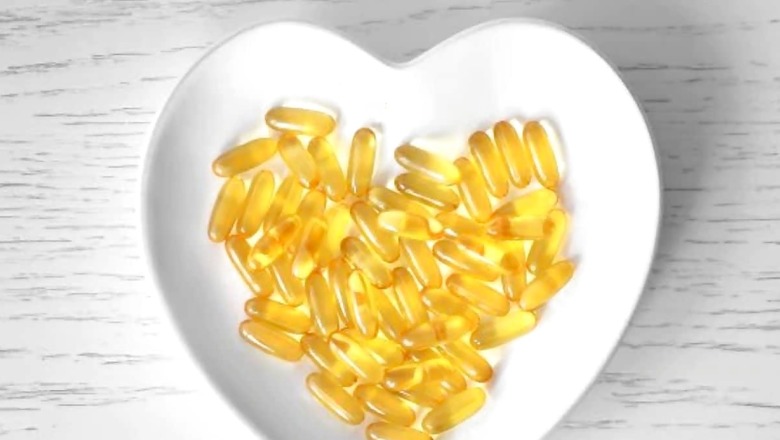
views
Omega 3 is a short form for omega-3 fatty acids. The increased paranoia over heart strokes post Covid and overall awareness on the significance of good health, has prompted many individuals to actively seek methods to bolster their immune systems.
The other factor contributing to rising demand is more vegetarian or vegan options in omega-3 pills. In a country where a majority of vegetarians were earlier hesitant about consuming fish oil tablets, the industry is now witnessing a rise of ALA-based vegetarian forms of omega 3.
Also, considering these pills are “dietary supplements”, people don’t require a prescription to buy them. Hence, enter any pharmacy or log in to e-pharmacy stores, you will find multiple brands offering the product in different shapes, sizes and combinations.
I recently checked with a physician – blame it on the spiking triglycerides in my lipid profile – and he immediately prescribed the supplement saying: “No harm in taking this.”
Let’s dig deeper and know the good and the bad about these golden-coloured pearl-like pills.
What is omega 3?
Fatty acids are essential for our body and, generally, they are obtained from food via alpha-Linolenic acid (ALA), eicosapentaenoic acid (EPA) and docosahexaenoic acid (DHA). While EPA and DHA are marine sources of omega 3, which is found in cold-water fatty fish such as salmon and other seafood, ALA is found mainly in plant oils such as flaxseed, soybean and canola oils.
These fats are helpful in conditions such as heart disease and for brain health. It is also known to reduce inflammation if given in required dosage.
Growth chart
On Tata 1mg, an online pharmacy, omega supplements form the largest share in the nutraceutical category, which has shown a growth of 60 percent year on year post Covid. This growth is attributed to the increase in the customer base of cardiac and mental care cohorts for the e-pharmacy, as the primary benefits of omega-3 products are related to heart and brain health.
Among all sellers, brands focusing purely on nutraceuticals have shown high salience in the omega category. Some top-selling brands in this category for Tata 1mg, as per the data shared with News18, are Seven Seas, Carbamide Forte, Tata 1mg, Healthkart and Swisse.
“Apart from omega 3, variants like omega triple strength have seen an increased purchase trend,” the data shows. While flaxseed remains the most widely accepted source of omega 3 among vegetarians, brands have also launched products made from marine algae to cater to the Indian market.
Krill oil, which is taken from a krill that are small, shrimp-like animals and is extracted from bodies of the Antarctic krill, has been gaining popularity especially in the global market.
Sushil Khaitan, founder of Pure Nutrition Naturals – a company manufacturing and selling omega-3 supplements – wrote in an opinion piece in Times of India that “the Covid trauma has driven increased demand for omega-3 fatty acids”.
He said omega-3 dietary supplements are rapidly making their place in India and the country may soon surpass China and the US. “As per reports and deep research of business analysts, health experts, nutraceutical scientists, doctors and nutritionists, it is observed that the worldwide market size of omega-3 fatty acids is projected to reach $1.92 billion by the end of 2027,” Khaitan wrote.
The size of the market before the Covid outbreak was $1.45 billion.
The science behind omega 3
According to experts, omega-3 supplements have been extensively studied over the decades. Cyriac Abby Philips, a specialist in hepatology and liver transplant medicine in Kerala, told me that omega-3 fatty acids have been extensively studied as preventive and as therapeutic agents in various diseases.
“In clinical medicine, the highest level of evidence lies in meta-analysis studies,” said Philips, who is known for busting pseudoscience myths. “Studies have shown that omega-3 fatty acid supplementation reduced the risk of death from cardiac diseases. But this is low to moderate-quality evidence.”
However, he said, high-quality evidence suggests that there are no benefits to cardiac health if dosage is increased. “This risk reduction was best with EPA fraction-based monotherapy rather than the widely available EPA+DHA combined fractions,” he said.
Also, a dose of 1 to 2 gm per day was considered effective and doses below this were not significantly beneficial, he said while quoting a study. “But caution must be used when using doses above 1 gm per day as this has been found to be associated with a high risk of cardiac arrhythmia or heart rate abnormalities,” he added.
There is also some modest evidence that omega-3 fatty acids – with EPA fraction of more than 60 percent and at doses less than or equal to 1 gm per day – have some benefits for depression. “Most studies have found no difference in health outcomes between those who took these supplements and placebo,” Dr Rajeev Jayadevan, former president of the Kochi wing of the Indian Medical Association, said.
It must, however, be kept in mind that only some studies among many have shown a positive result. “Fish like mackerel and sardine are a natural source of omega-3 fatty acids,” he said. “It is agreed that consumption of fish is associated with good health overall, and is specifically recommended by the American Heart Association as part of a heart-healthy diet.”
He added: “However, whether omega-3 supplements will preferentially help those who do not consume fish is unknown.”
In crux…
While the clear benefits of popping omega 3 are still under doubt, it can still be given a shot – only and only if your medical adviser believes so. Don’t self-prescribe even if it’s a dietary supplement or herbal product because your health matters.




















Comments
0 comment